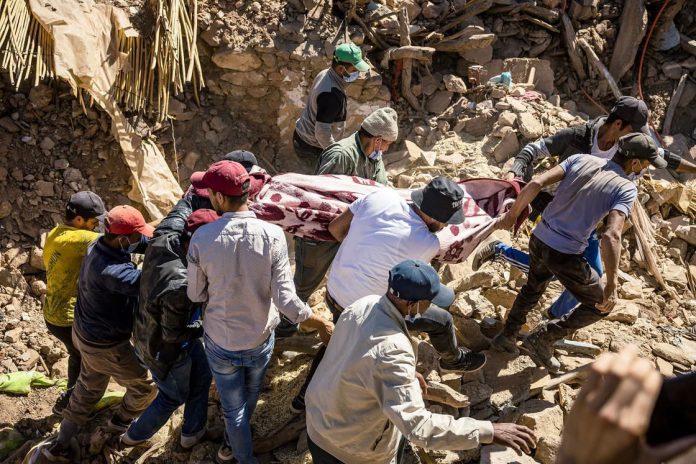Survivors of Morocco’s deadliest earthquake in more than six decades struggled to find food, water and shelter on Sunday as the search for the missing continued in remote villages and the death toll of more than 2,100 seemed likely to rise further.
Many people were preparing to spend a third night in the open after the 6.8 magnitude quake hit late on Friday. Relief workers face the challenge of reaching the worst-affected villages in the High Atlas, a rugged mountain range where settlements are often remote and where many houses crumbled.
The death toll climbed to 2,122 with 2,421 people injured.
The damage done to Morocco’s cultural heritage became more evident as local media reported the collapse of a historically important 12th century mosque. The quake also damaged parts of Marrakech old city, a UNESCO World Heritage site.
In Moulay Brahim, a village 40 km (25 miles) south of Marrakech, residents described how they dug the dead from the rubble using their bare hands.
On a hillside overlooking the village, residents buried a 45-year-old woman who had died along with her 18-year-old son, a woman sobbing loudly as the body was lowered into the grave.
As he retrieved possessions from his damaged home, Hussein Adnaie said he believed people were still buried in the rubble nearby. “They didn’t get the rescue they needed so they died. I rescued my children and I’m trying to get covers for them and anything to wear from the house,” he said.
Yassin Noumghar, 36, complained of shortages of water, food and power, saying he had received little government aid so far.
“We lost everything, we lost the entire house,” he said.
“We want just for our government to help us.”
Later, sacks of food were unloaded from a truck which local official Mouhamad al-Hayyan said had been organized by the government and civil society organizations.
Twenty-five bodies had been brought to the village’s small clinic, according to staff.
With many homes built of mud bricks and timber or cement and breeze blocks, structures crumbled easily. It was Morocco’s deadliest quake since 1960 when a tremor was estimated to have killed at least 12,000 people.
In the badly hit village of Amizmiz, residents watched as rescuers used a mechanical digger on a collapsed house.
“They are looking for a man and his son. One of them might still be alive,” said Hassan Halouch, a retired builder.
The team eventually recovered only bodies.
The army, mobilized to help the rescue effort, set up a camp with tents for the homeless.
With most shops damaged or closed, residents struggled to get food and supplies.
“We’re still waiting for tents. We haven’t had anything yet,” said Mohammed Nejjar, a laborer, who was folding his blanket in a makeshift shelter constructed with bits of wood.
“I had a little food offered by one man but that’s all since the earthquake. You can’t see a single shop open here and people are frightened to go inside in case the roof falls down.”
The government said on Saturday it was taking urgent measures to address the disaster including reinforcing search and rescue teams, providing drinking water and distributing food, tents and blankets.
Prayers for the dead
The World Health Organization said more than 300,000 people have been affected by the disaster.
Pope Francis offered prayers and solidarity for the victims.
Morocco has declared three days of mourning and King Mohammed VI called for prayers for the dead to be held at mosques across the country.












